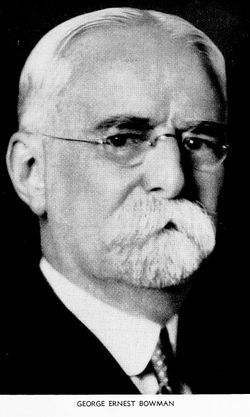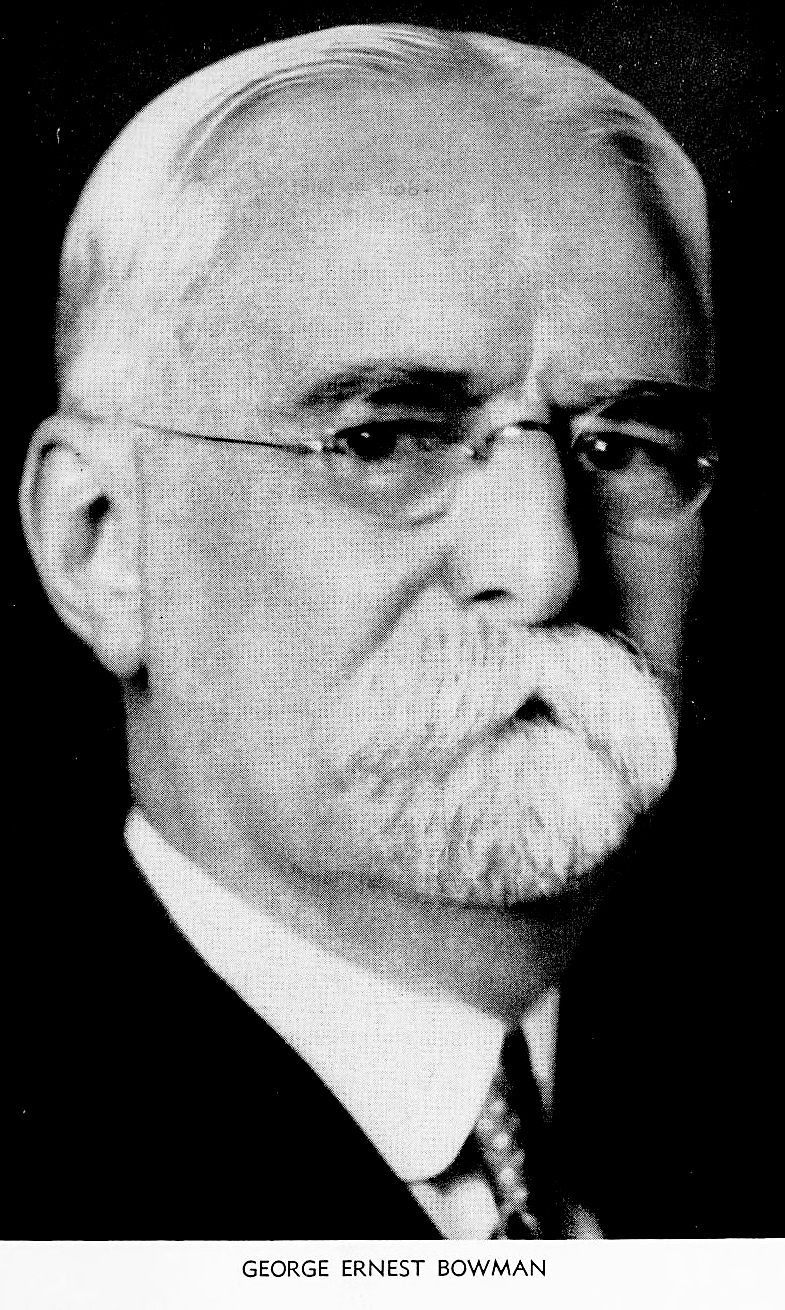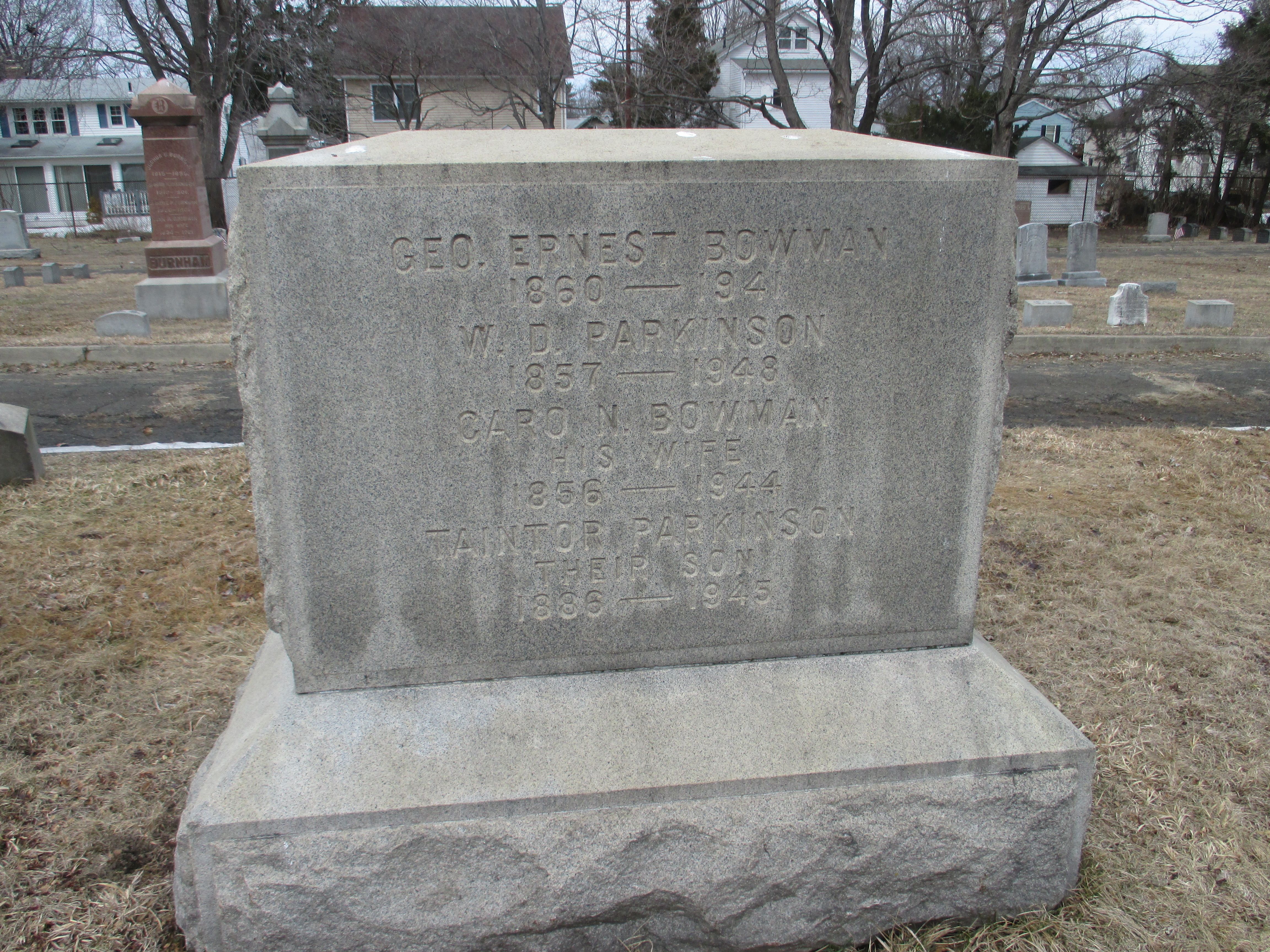Below Bio added by Bruce Hunt Sr - Contributor #49629142
From the Mayflower Society of Mayflower Descendants
History of the Massachusetts Society of Mayflower Descendants - Incorporators
1. GEORGE ERNEST BOWMAN, age 36, born in Manchester, NH in 1860, son of George Augustus and Ernestine (Lord) Bowman, was brother of incorporator Austin Lord Bowman, second cousin to incorporators Arthur Payson Dana, Nathaniel Upham Walker and Charles P. Clark Jr. and first cousin once removed to incorporators Edward Lord Clark and Charles P. Clark Sr., all of whom were descendants of Pilgrim William Brewster through the Lord family. George's father, a graduate of Bowdoin College and Princeton Theological Seminary, was a Congregational minister at Kennebunkport, Maine, New York City, Manchester, New Hampshire, and South Windsor, Connecticut. He also served as a member of the Connecticut legislature. George Ernest's mother was the daughter of Charles Austin Lord, also a graduate of Bowdoin, a professor of languages at Marion College in Missouri, and later the editor of the religious paper Christian Mirror. He was active in the formation of the first Temperance Society in New York City and served as superintendent of schools for the state of Maine.
George's older sister, Caroline North Bowman, was born in 1856 at Portland and married William Dwight Parkinson, son of the Rev. Royal Parkinson. Mrs. Parkinson and her three sons, Dana, Herman and Royal, all became members of the Mayflower Society, and several descendants are still members. His brother, Austin Lord Bowman, was incorporator number 27 (see below).
George Ernest Bowman was the product of a highly academic background, deeply influenced by religion and temperance. He graduated from Hartford Public School and went on to Yale, graduating with his brother Austin in the class of 1883, and receiving a Bachelor of Arts degree. George tried private tutoring in Farmington, Connecticut, and teaching at a day school in Plainfield, New Jersey, but in 1886 he joined D.C. Heath & Company, publishers of school books and came to Boston. In 1892 he changed to the insurance business as an agent for Hartford Life and Annuity, which he left in 1896 to pursue "historical researches."
Bowman's interest in genealogy apparently began shortly after his graduation from Yale. In 1895 he became one of the founders of the Boston chapter of the Sons of the American Revolution, serving as its first secretary and second president. He also belonged, during his lifetime, to the Society of Colonial Wars in Massachusetts, the New Hampshire Society of the Cincinnati, the Pilgrim Society of Plymouth, the Cape Cod Pilgrim Memorial Association, the Standish Monument Association, the Old Colony Historical Society, the Order of Colonial Governors, the Yale Club, the Boston City Club, the New England Historic Genealogical Society, the Order of the Masons, the Congregational church and the Republican party. Meticulous in his personal habits, good-looking and always well-groomed, Bowman was a man of crisp, definite opinions, often curt, blunt and terse. At the same time, he could be courteous, gentlemanly, a favorite of the ladies, and could command the loyalty of friends and associates. Walter M. Pratt, former Governor of Massachusetts Society of Mayflower Descendants, wrote a biography of Bowman in 1963, describing him as:
An ideal secretary, businesslike and systematic, with a nervous energy that kept him on the jump and his two stenographers busy ... [George would be remembered for] the great pains and patient labor he gave to historical and genealogical research ... his insistence on accuracy, and his ability to discriminate between dependable and undependable evidence....
During his lifetime, Bowman's control over the Massachusetts Society of Mayflower Descendants was absolute. He served as the Society's first and only Secretary until his death in 1941 and performed the duties of the Historian by processing all lineage papers and amassing a genealogical collection that filled more than fifty file drawers. Walter Pratt related that shortly after his own election to the Society in 1917, and finding himself chairman of the nominating committee, he approached Bowman to plead limited knowledge for such a position:
"Not at all," said Mr. Bowman, "Here are some suggestions," and handed over a paper with the complete slate he hoped would be elected. New members seldom argue. I figure Mr. Bowman knew who would be best for the Society, showed the list to the other members of the committee, and we placed the named in nomination. Mr. Bowman at times lacked tact, but he certainly was a clever politician.
Bowman chose his officers from the ranks of the Social Register and Who's Who, saying "It gives the Society desirable publicity." But Pratt claimed he never chose rubber-stamp types. As a rule, Pratt says, Bowman chose business and professional men and women, "who did not hesitate to assert themselves." Underneath it all, however, they were there at the sufferance of Bowman, and while their talents and energies helped Massachusetts Society of Mayflower Descendants to prosper, it was Bowman who stood at the helm.
Below Bio added by Bruce Hunt Sr - Contributor #49629142
From the Mayflower Society of Mayflower Descendants
History of the Massachusetts Society of Mayflower Descendants - Incorporators
1. GEORGE ERNEST BOWMAN, age 36, born in Manchester, NH in 1860, son of George Augustus and Ernestine (Lord) Bowman, was brother of incorporator Austin Lord Bowman, second cousin to incorporators Arthur Payson Dana, Nathaniel Upham Walker and Charles P. Clark Jr. and first cousin once removed to incorporators Edward Lord Clark and Charles P. Clark Sr., all of whom were descendants of Pilgrim William Brewster through the Lord family. George's father, a graduate of Bowdoin College and Princeton Theological Seminary, was a Congregational minister at Kennebunkport, Maine, New York City, Manchester, New Hampshire, and South Windsor, Connecticut. He also served as a member of the Connecticut legislature. George Ernest's mother was the daughter of Charles Austin Lord, also a graduate of Bowdoin, a professor of languages at Marion College in Missouri, and later the editor of the religious paper Christian Mirror. He was active in the formation of the first Temperance Society in New York City and served as superintendent of schools for the state of Maine.
George's older sister, Caroline North Bowman, was born in 1856 at Portland and married William Dwight Parkinson, son of the Rev. Royal Parkinson. Mrs. Parkinson and her three sons, Dana, Herman and Royal, all became members of the Mayflower Society, and several descendants are still members. His brother, Austin Lord Bowman, was incorporator number 27 (see below).
George Ernest Bowman was the product of a highly academic background, deeply influenced by religion and temperance. He graduated from Hartford Public School and went on to Yale, graduating with his brother Austin in the class of 1883, and receiving a Bachelor of Arts degree. George tried private tutoring in Farmington, Connecticut, and teaching at a day school in Plainfield, New Jersey, but in 1886 he joined D.C. Heath & Company, publishers of school books and came to Boston. In 1892 he changed to the insurance business as an agent for Hartford Life and Annuity, which he left in 1896 to pursue "historical researches."
Bowman's interest in genealogy apparently began shortly after his graduation from Yale. In 1895 he became one of the founders of the Boston chapter of the Sons of the American Revolution, serving as its first secretary and second president. He also belonged, during his lifetime, to the Society of Colonial Wars in Massachusetts, the New Hampshire Society of the Cincinnati, the Pilgrim Society of Plymouth, the Cape Cod Pilgrim Memorial Association, the Standish Monument Association, the Old Colony Historical Society, the Order of Colonial Governors, the Yale Club, the Boston City Club, the New England Historic Genealogical Society, the Order of the Masons, the Congregational church and the Republican party. Meticulous in his personal habits, good-looking and always well-groomed, Bowman was a man of crisp, definite opinions, often curt, blunt and terse. At the same time, he could be courteous, gentlemanly, a favorite of the ladies, and could command the loyalty of friends and associates. Walter M. Pratt, former Governor of Massachusetts Society of Mayflower Descendants, wrote a biography of Bowman in 1963, describing him as:
An ideal secretary, businesslike and systematic, with a nervous energy that kept him on the jump and his two stenographers busy ... [George would be remembered for] the great pains and patient labor he gave to historical and genealogical research ... his insistence on accuracy, and his ability to discriminate between dependable and undependable evidence....
During his lifetime, Bowman's control over the Massachusetts Society of Mayflower Descendants was absolute. He served as the Society's first and only Secretary until his death in 1941 and performed the duties of the Historian by processing all lineage papers and amassing a genealogical collection that filled more than fifty file drawers. Walter Pratt related that shortly after his own election to the Society in 1917, and finding himself chairman of the nominating committee, he approached Bowman to plead limited knowledge for such a position:
"Not at all," said Mr. Bowman, "Here are some suggestions," and handed over a paper with the complete slate he hoped would be elected. New members seldom argue. I figure Mr. Bowman knew who would be best for the Society, showed the list to the other members of the committee, and we placed the named in nomination. Mr. Bowman at times lacked tact, but he certainly was a clever politician.
Bowman chose his officers from the ranks of the Social Register and Who's Who, saying "It gives the Society desirable publicity." But Pratt claimed he never chose rubber-stamp types. As a rule, Pratt says, Bowman chose business and professional men and women, "who did not hesitate to assert themselves." Underneath it all, however, they were there at the sufferance of Bowman, and while their talents and energies helped Massachusetts Society of Mayflower Descendants to prosper, it was Bowman who stood at the helm.
Family Members
Sponsored by Ancestry
Advertisement
Advertisement












